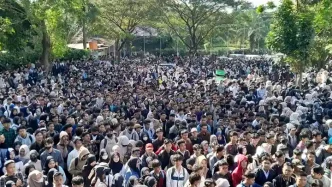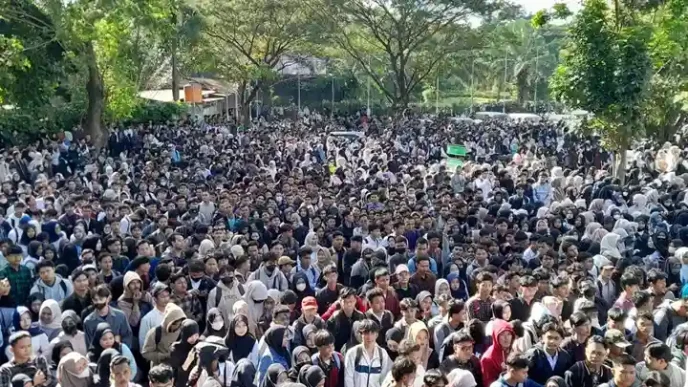The death of Arya Daru Pangayunan, a 39-year-old junior diplomat with Indonesia’s Foreign Ministry, has left authorities and the public grappling with unanswered questions. Found lifeless in his rooming house in Central Jakarta on July 8, 2025, with his head covered in a plastic bag and wrapped in yellow duct tape, Arya’s passing has been ruled as resulting from upper airway obstruction. Yet, the Jakarta Police have stopped short of labeling it a suicide, leaving a cloud of mystery over the circumstances of his death.
A Solitary End in Gondangdia
On the morning of July 8, 2025, a rooming house guard in Gondangdia, Central Jakarta, made a grim discovery. Arya Daru Pangayunan, a diplomat specializing in the protection of Indonesian citizens abroad, was found lying on his bed, his head encased in a plastic bag secured with yellow duct tape. The room was locked from the inside, adding to the enigma of the scene. According to Jakarta Police director for general crimes, Sr. Comr. Wira Satya Triputra, the investigation has concluded that no other individuals were involved in Arya’s death.
“The investigation indicated that Arya’s death occurred without the involvement of anyone else” Wira stated during a press briefing on July 29, 2025. He further revealed that only Arya’s fingerprints were found on the duct tape, and there was no evidence of physical or psychological threats or violence directed at him prior to his death. Despite these findings, Wira refrained from making a definitive statement on whether Arya took his own life, leaving room for speculation among observers.
Clues from the Investigation
The Jakarta Police have pieced together Arya’s final hours through CCTV footage and witness testimonies. On the evening before his body was discovered, Arya was seen visiting a shopping mall in Jakarta. Later, he took a taxi to the Foreign Ministry building, where he spent approximately an hour near midnight on the rooftop. Reports indicate that he attempted to climb a wall there before returning to his rooming house. This unusual behavior has raised questions about his state of mind in the hours leading up to his death.
During the three-week investigation, police questioned 22 individuals, including Arya’s coworkers, a taxi driver, the boarding house guard and owner, and his wife. Forensic experts found no harmful substances in his system that could have contributed to his death. Toxicology tests revealed only paracetamol and chlorpheniramine—common medications for pain relief and allergies with mild sedative effects. Physical evidence presented at the press briefing included the yellow duct tape, Arya’s laptops, medical records, and an old mobile phone he used until 2022. Notably, his most recent phone remains missing, adding another layer of complexity to the case.
Personal Struggles in the Background
An analysis of Arya’s email history provided a glimpse into his personal challenges. According to a forensic psychology investigator who spoke at the Tuesday briefing, Arya had contacted mental health services in 2013 and 2021. The investigator noted that several emails suggested an intention to commit suicide due to problems he faced at the time. While these communications are from years prior, they paint a picture of a man who may have battled inner turmoil, though no recent evidence of such intent has been confirmed.
Arya was reportedly preparing for a new posting in Finland, scheduled to depart at the end of July 2025. This upcoming transition, often a stressful period for diplomats adjusting to new environments and responsibilities, could have added pressure to his personal circumstances. However, without concrete evidence linking these factors to his death, authorities remain cautious in drawing conclusions.
A Diplomat’s Life Cut Short
Arya Daru Pangayunan dedicated his career to safeguarding Indonesian citizens abroad, a role that often involves navigating complex and emotionally taxing situations. Colleagues described him as a committed professional, though few details about his personal life have been shared publicly out of respect for his family’s privacy. His death has sent ripples through the Foreign Ministry, prompting quiet reflection on the unseen pressures faced by those in diplomatic service.
The absence of foul play, as confirmed by the police, shifts the focus to the personal circumstances surrounding Arya’s final days. The locked room, the solitary fingerprints on the duct tape, and the lack of external threats all point to a deeply private act or accident. Yet, the missing phone and the rooftop visit linger as unresolved threads in an otherwise conclusive investigation.
Broader Implications for Mental Health Awareness
While the Jakarta Police have not officially classified Arya’s death as a suicide, the case has sparked conversations about mental health support within high-stress professions like diplomacy. In Indonesia, as in many parts of Southeast Asia, mental health remains a stigmatized topic, often left unaddressed until tragedy strikes. The revelation of Arya’s past outreach to mental health services underscores the importance of accessible resources and destigmatization efforts for public servants who may face unique pressures.
Government institutions, including the Foreign Ministry, may face renewed calls to implement robust wellness programs for employees, especially those preparing for international postings. The diplomatic corps often operates under intense scrutiny and with the burden of representing national interests abroad, factors that can exacerbate personal struggles if left unsupported. Though it is unclear whether such support could have altered the outcome in Arya’s case, his story serves as a poignant reminder of the human cost of unaddressed mental health challenges.
Unanswered Questions Persist
As the investigation into Arya Daru Pangayunan’s death draws to a close, the Jakarta Police have provided a detailed account of the physical evidence and circumstances surrounding his passing. Yet, the hesitation to categorize the incident as a suicide or accident leaves a void filled by public curiosity and concern. The missing phone, in particular, stands as a silent question mark—potentially holding digital clues to Arya’s state of mind or final actions.
For now, the official narrative rests on the conclusion of upper airway obstruction with no external involvement. The diplomat’s family, colleagues, and the wider community are left to mourn a life cut short under circumstances that may never be fully understood. As the Foreign Ministry prepares to honor Arya’s service, perhaps in the quiet of a memorial far from the headlines, the mystery of his final moments lingers as a somber note in Jakarta’s bustling capital.
















